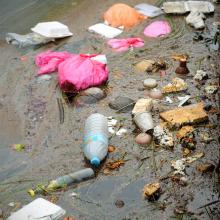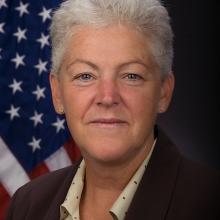EPA
In the Hebrew and Christian scriptures, there is a Psalm that proclaims: “the earth is the Lord’s and everything in it, the world, and all who live in it” (Psalm 24:1). There is no part of this world that God is not aware of, cannot lay claim to, and does not rule. Christians affirm that as people of faith we’re called to be stewards over creation, answering one day for how we’ve treated the earth.
And part of that stewardship means understanding how this world works and what it needs in order to thrive. Unfortunately the din of our political ideologies has too often drowned out the biblical calling to care for creation.
In Texas, the State Board of Education will recommend new textbooks for all its students—and because it has such a large population, what they decide could determine what students in other states learn about science. There are several ideologues submitting textbook critiques to the board and their reviews will factor into each book’s overall score and likelihood of being approved by the school board. These ideologues could block the use of textbooks that teach the reality of climate change for the whole country’s public school students.
This week the EPA is holding the last few of its listening sessions around the country — 11 in total by the end of the week – to hear what Americans have to say about the EPA’s plans to tackle climate change.
These listening sessions are our chance to give the EPA our comments in person — everyone can register for a three-minute testimony spot — about the agency’s upcoming rule on carbon pollution from existing power plants.
Occurrences of oil spills in several states have garnered little media attention in the last few years. In some cases, prompt reports are recorded, yet in others, days have gone by before the authorities are alerted and the spill becomes public knowledge.
The most recent episode happened Oct. 15, in Port of Long Beach, Calif. Upon discovery of an oil leak, Exxon Mobil announced that it was temporarily suspending operations of its pipeline system. The pipeline, which connects to the company’s refinery in Torrance, carries up to 155,000 barrels of oil per day. Exxon filed documents with the California Emergency Management Agency that claimed the leak did not affect waterways, although the company was ordered to pay a $236 million fine for contaminating groundwater in New Hampshire this past April.
Another spill was initially discovered on Sept. 29 by North Dakota farmer Steve Jensen, the Associated Press reported. While harvesting wheat, Jensen discovered the leak in his field “spewing and bubbling 6 inches high.” The rupture was a break in Tesoro Corporation’s underground pipeline. While it remains unconfirmed, early evidence cites that corrosion on the 20-year-old pipeline is the cause of rupture. At least 20,600 barrels of oil flooded the 7-acre spill zone, equal to about 7 football fields.
The delay in making public North Dakota’s oil spill proves as worrisome as the spill itself. It took 11 days after the spill’s discovery for it to become public knowledge. Officials claim they were not aware how extensive the spill was, but critics point to the state’s financial benefits in the recent gas and oil boom as reason for the authorities’ hesitancy in coming down on oil companies. But economic incentives shouldn’t diminish the serious need to weigh environmental risks and costs.
The cases begin to pile up.
During the government shutdown, some cuts have caught the public’s attention more than others. And some people are rejoicing over the cuts faced by the Environmental Protection Agency and other environmental agencies. But the shutdown of our environmental programs is affecting people’s lives in ways that might surprise you.
1. National Parks closures are more than an inconvenience
In some National Parks across the country, employees are stranded. Employees who live on park grounds, like park rangers and concession workers, have no work or pay, and because the parks are closed, they’re not even allowed to take solace in the trails that surround them. And in at least one case, they don’t have any food. About 2,200 employees – 1,800 of them concession workers – are stranded in Grand Canyon National Park. A local food bank has started making deliveries, because those people are going hungry and without pay.
This Wednesday on Capitol Hill, the House subcommittee on Energy and Power held a hearing to discuss the Obama administration’s climate change policies and activities. The policies in question were the president’s Climate Action Plan, announced this summer, which has three main pillars:
- cutting carbon emissions,
- leading international efforts to combat climate change, and
- preparing the United States for climate change impacts.
The Environmental Protection Agency Administrator Gina McCarthy and the Energy Secretary Ernest Moniz were present to answer questions about the president’s plan, which works with new and existing programs in both agencies to reduce our climate change pollution and increase our resilience to climate change. Some of the programs are required by a recent Supreme Court decision that labeled carbon dioxide a pollutant; others, as Moniz pointed out, would happen to carry the benefit of energy efficiency.
For some members of Congress, this is a problem because they do not wish to cede any ground to the executive. For others, it is a problem simply because they do not wish to do anything about climate change.
Columbia, Mississippi is a small rural town most known as the home of Walter Payton, NFL player for the Chicago Bears. It is also my home — the place where I was born and raised.
On January 1, 1992, Jesus People Against Pollution was founded in Columbia. Residents had discovered that the town had been heavily polluted from the Newsom Brothers/Old Reichhold Chemical Company facility, now closed but still registering high levels of hazardous waste — what the EPA calls a “Superfund site.”
In March 1977, the plant exploded and wrecked the facility and surrounding community. The Old Reichhold Chemical Company abandoned their facility and hired an inexperienced contractor to dispose of the remaining toxins left on the site.
Forget about future generations – climate change is already hitting poor people around the world, not to mention contributing to natural disasters in the U.S. from New York City to Arizona. Apparently that’s not enough for some members of Congress, who have chosen to use their authority to try to block any and all attempts to do something about the problem.
Earlier this month, President Barack Obama announced a major, comprehensive plan of action on climate change – changes that would do much to protect human health, the poor, and future generations by mitigating some of the worst impacts of climate change. A central part of the plan is to address climate pollution at its largest source: coal-fired power plants.
Unfortunately, many members of Congress are already taking steps to decry the president’s plan as a “war” – on coal, on American energy, and yes, even on America itself. Leaders from John Boehner to Michele Bachmann to Joe Manchin have made it pretty clear that they view attempts to care for creation as an assault on our country.
Last week, concentrations of carbon dioxide in the atmosphere reached 400 parts per million – nearly 15 percent over what many scientists estimate is a safe level. Amid this and other crises in creation, the Environmental Protection Agency needs a strong leader to navigate the complex policy and economic situation that governs environmental policy.
In March, In March, President Barack Obama nominated Gina McCarthy to lead the EPA. At the time, many regarded her as a shoo-in, as she has held top posts under Republican governors, was endorsed by many in the energy industry, and has acted as assistant administrator of the EPA under President Obama since 2009.
It was surprising, then, when all eight Republican members of the Senate’s Environment and Public Works Committee decided to boycott McCarthy’s nomination hearing. This surprise decision, which effectively canceled the vote, was part of a longer-term pattern of obstruction and partisanship on once-routine matters.
In the face of such unprecedented risk to human health and well-being, many were surprised that senators tasked with studying issues of clean air, clean water, and similar issues put ideology ahead of fairness in obstructing the vote. Sen. David Vitter, the leader of the obstructionist group, said it best himself in 2005 when discussing judicial appointments: “I think that every nominee deserves a vote. It’s a matter of fairness.”
Climate defenders should celebrate the news that Obama is continuing to delay signing a permit that would allow foreign-owned mining company TransCanada a permit to build the northern route of the highly controversial Keystone XL pipeline across the U.S.
After the State Department once again released a highly flawed assessment in March and the Environmental Protection Agency called it “deeply flawed” (again), we see that grassroots pressure is creating an effective roadblock on this incredibly dangerous path.
From Reuters:
The Obama administration is unlikely to make a decision on the Canada-to-Nebraska Keystone XL pipeline until late this year as it painstakingly weighs the project’s impact on the environment and on energy security, a U.S. official and analysts said on Friday.
The decision may not be made until November, December or even early 2014, said a U.S. official … who did not want to be named given the sensitive nature of the project.
Analysts agreed that a decision would not be made by this summer as the State Department had suggested when it issued an environmental review on the pipeline on March 1.
In the midst of our celebration of Earth Day, government agencies continued the debate over the Keystone XL Pipeline, which would transport oil from Canada’s tar sands across the United States into the gulf coast of Texas to be refined and shipped elsewhere. The State Department, tasked with reviewing the pipeline’s environmental impact, gave it a tentative pass a month and a half ago.
Activists across the country sprang into action to oppose the pipeline, citing its contribution to climate change and risk of oil spills. Supporters of the pipeline shot back, denying the climate impact of the pipeline and claiming that the oil would be produced whether or not the Keystone project moved forward.
The Environmental Protection Agency responded yesterday, calling into question the State Department’s findings and echoing the concerns of environmental activists everywhere: the Keystone Pipeline would be greatly exacerbate climate change.
In a full vote Wednesday morning the Senate rejected a measure intended to roll back the Environmental Protection Agency's implementation of the Mercury and Air Toxics Standards (MATS), a rule that would limit mercury emissions from coal-burning power plants.
As Sen. Lamar Alexander (R-Tenn.) said, “We don’t want to make the Great Smokies the Great Smogies.”
For the past four years, we have heard angry cries and even threats over the government bailouts for big banks, the auto industry and others during this economic downturn. Senators and representatives have lost their jobs over these bailouts. Yet Congress has been giving special breaks and what amounts to subsidies to the coal-fired utility industry for more than 20 years. It’s not taxpayer money but the health and life of our children that is being spent.
Editor's Note: The following is testimony delivered by Alycia Ashburn, Creation Care Campaign Director for Sojourners, to the Environmental Protection Agency's New Source Pollution Standards for Carbon Pollution Hearing on May 24 in Washington, D.C.
My presence and testimony here today – in support of the EPA’s New Source Standards for Carbon Pollution – is as much a religious and personal act as it is a professional one.
While I am here wearing my “work hat” – as director of the creation care campaign at Sojourners (one of the nation’s largest network of Christians committed to social justice) - I wear my many other hats at the same time: U.S. citizen, Christian, congregation member, educator/trainer for Lutherans Restoring Creation, biologist, wife, daughter, runner, National Parks lover, and last but certainly not least, especially in this context: asthma sufferer.










